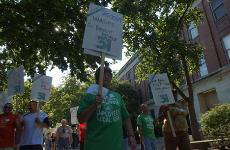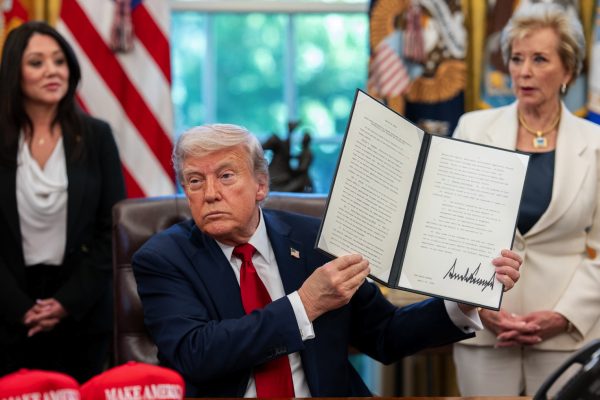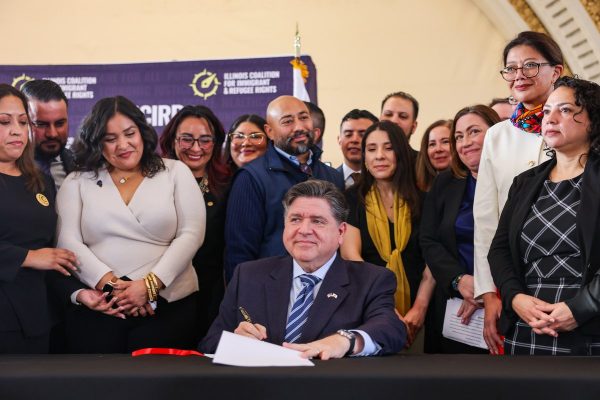Union, University enter into mediation

Members from AFSCME Local 698 and other chapter across Illinois picketed between Henry Administration and the English building late Monday afternoon. The group shouted “No contract? No peace!” while marching across Campustown. Local 698 and the University Frank Radosevich II
Jul 25, 2006
Last updated on May 12, 2016 at 03:52 a.m.
Members of the American Federation of State, County and Municipal Employees Local 698 and the University will meet today for federal mediation in hopes of securing a new working contract both parties will respect.
The union, the oldest on campus, represents approximately 395 employees ranging from laboratory technicians to farm laborers. It has been without a contract with the University for nearly a year when its previous one expired last August. Since then, multiple meetings between the two parties have failed to produce a new contract on which both sides agree.
Late Monday afternoon, members from Local 698 along with other AFSCME members from across Illinois picketed in front of the Swanlund Administration Building, Henry Administration Building and the Illini Union. Fellow chapters from Chicago to Carbondale marched in unison while organizers led the snaking column in angry chants as the crowd showed their solidarity for Local 698 and vented their frustrations with the nearly year-old negotiations.
Currently, the University has offered Local 698 a three-year contract it considers to be the best and final offer. The agreement gives a two percent pay raise for the first year, yet, the raises would not extend to last fall when the previous contract ended, thus ensuring no back pay. Moreover, for the last two years raises would be one-and-a-half percent less than those given to academic professionals and other employees.
Get The Daily Illini in your inbox!
Now, after stalled talks and deadlocked bargaining, both sides are putting their faith and future in federal mediation.
“We’re very optimistic and hopeful that the mediator will help the two sides work together in a way that is positive for everyone involved,” University spokeswoman Robin Kaler said.
Kaler said the University has consistently worked with the union, attempting to meet them halfway during negotiations.
“We don’t want it to be an us versus them,” Kaler said. “We want to work together.”
Victor Osuna, chief negotiator for Local 698, said the union is willing to negotiate only if the University provides it with a decent proposal.
“Our membership is ready for anything that might come down,” Osuna said. “At the end of the day, it’s going to have to be an fair and equitable contract.”
Federal mediation, a voluntary process first proposed by the University, will employ a neutral third-party as a facilitator for the negotiations. The mediator will assist the bargaining process in various ways by helping establish ground rules for the negotiations, clarifying divisive differences, defining key issues and generating new options for both parties.
In the end, the process may or may not lead to an agreement between the parties and it is not clear how long the it will last.
“There is no way to predict,” Kaler said. “We certainly hope that this goes as quickly as possible.”
What is clear is that Local 698 will not accept the University’s current offer.
“I am hoping that they will walk in with a more reasonable proposal to the mediator,” Vice President of Local 698 Margaret Lewis said. “The proposal we have right now is totally unacceptable.”
According to Lewis, a union member for 12 years and vice president since January, this is the first time the union’s negotiations have lasted so long.
“Honestly I believe that the University did not bargain in good faith,” Lewis said. “In the past, negotiations have gone on for a long time but we have always reached an agreement.”
Osuna said the union’s main objections are to the low percentage raises, lack of back pay and a proposed “zipper” clause, which forbids either side to renegotiate any terms of in or outside of the contract while it is in effect. The union feels this clause would allow the University to act unilaterally by preventing any sort of future negotiations.
Kaler said the clause is necessary for fully concluding and signing the contract.
“If you’re never finished then you really haven’t agreed to anything,” Kaler said.
Local 698 has also objected in the past to pay raises given to University administrators, feeling they have been passed over.
Kaler defended the raises saying University administrators have heavy workloads and obligations.
“Those with a higher pay scale have very great responsibility and are contributing largely to the success of the campus,” Kaler said.
Additionally, Kaler said that a tight financial budget has forced the University to make some difficult choices.
“We’ve had a flat, cut, or slightly increased state budget,” Kaler said. “We are at a point in our history where resources are scarce and we are doing everything we can to live within our means.”
When asked would the union strike if the final contract was unacceptable, Osuna quickly replied “absolutely.”
Kaler was hopefully that any strike by Local 698 could be avoided.
“We sure hope that we don’t come to that,” Kaler said.





